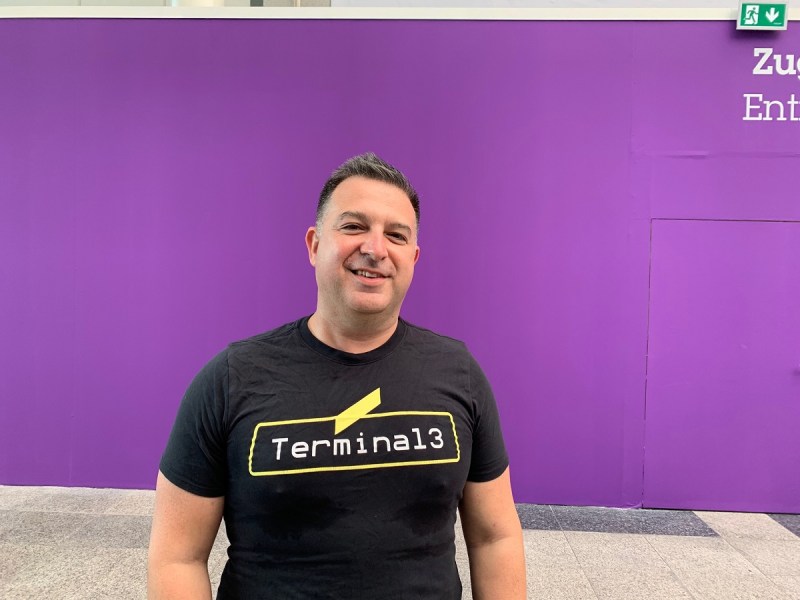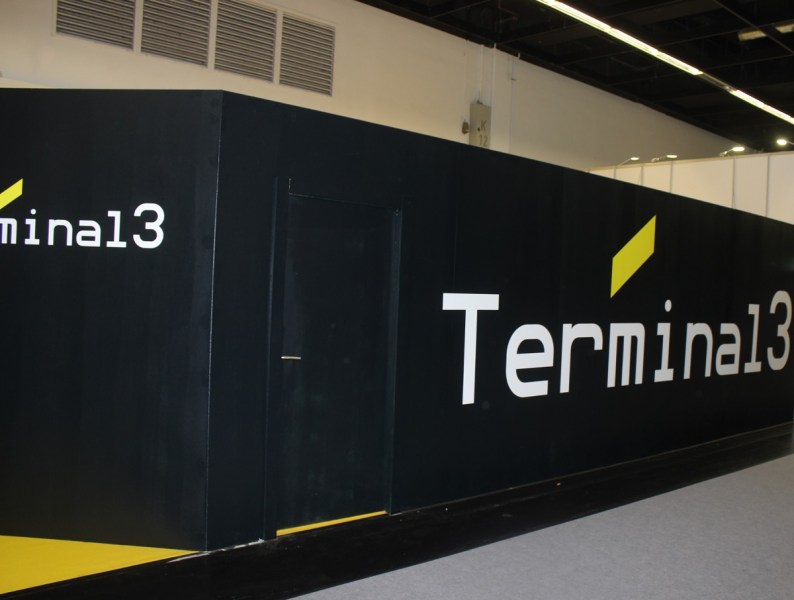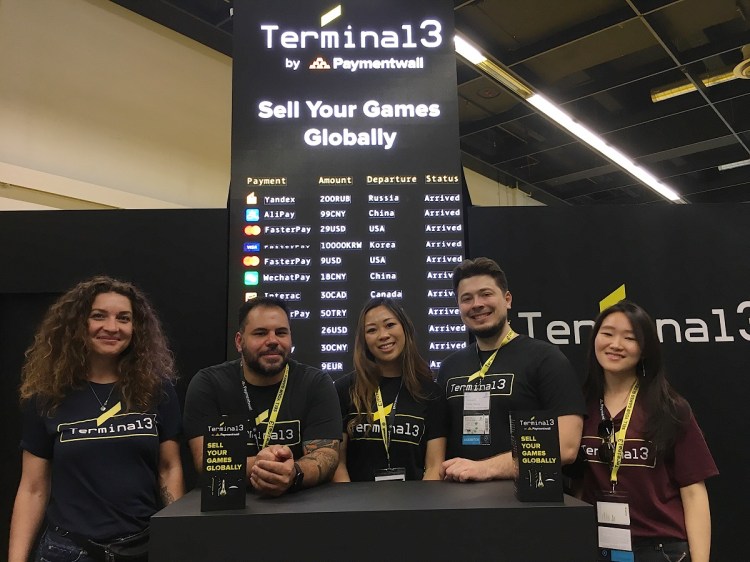Paymentwall built a business as a global payments platform, with much of its focus on games. Last year, the company spun out its Terminal3 as a platform for monetizing and distributing games. Now it is making it easier for indie, small, and medium-size game companies to build multiple customizable online shops, sell digital goods, and set up in-game purchases.
Honor Gunday, CEO of Paymentwall, said that the company started in 2011 in San Francisco as a bootstrapped monetization platform for games on Facebook. As it grew, Gunday said the company realized that gaming clients needed enhanced fraud protection, quicker transaction analysis, local payment processing, local distribution, tax remittance, and integrated customer service for rapid responses.
I met with Gunday at the Gamescom fan event in Cologne, Germany. He talked about how the Terminal3 ecommerce shop builder will enable better shops without an exclusivity clause. Terminal3’s global marketplace will help gaming companies sell in hard-to-reach markets. With Terminal3’s Global Marketplaces feature, merchants of all sizes can sell their goods in countries which require local entities including India, Vietnam, the European Union, and other places.
The idea is to make game distribution more fair for game developers around the world, Gunday said.
June 5th: The AI Audit in NYC
Join us next week in NYC to engage with top executive leaders, delving into strategies for auditing AI models to ensure fairness, optimal performance, and ethical compliance across diverse organizations. Secure your attendance for this exclusive invite-only event.
Here’s an edited transcript of our interview.

Above: Honor Gunday is CEO of Paymentwall.
GamesBeat: What’s new for you?
Honor Gunday: I don’t know if you saw last year’s announcement, but we’ve launched an e-commerce shop. We’ve transitioned our customers, PaymentWall’s customers, to [Terminal3’s payments platform] for the past eight months. It’s live now with about 80 percent of our customers and doing well.
Our next step is to expand in new regions. We realize there are new, up-and-coming markets where payment providers can’t provide services because there are emerging payment options. Game companies need local entities. India is one of these. We have an audience of 1.4 billion people to reach there. I don’t know how many of them will be gamers, but we’ll have at least 100 million, I think. Some will be on PC and some will be on mobile. Mobile will be covered by Google Play and Apple, but anything outside of that is open territory for game companies to launch in.
Japan is a difficult market, or it’s perceived as a difficult market, but new payment options are emerging there as well. Chinese companies are moving in, and other new players. Now companies can also integrate these options and sell directly to consumers. The cultural restrictions and so on are changing. It’s not like it used to be. Japan is another new market for us.
Southeast Asian countries are getting their own options, places like Vietnam. Game companies that want to launch in Vietnam also need a local entity, a local partner. But if they have payment options and can list their game on a storefront, they can just go live and process payments. We remit the money back to them.
GamesBeat: I remember Japan being a funny case where people would go to the store, buy a card, go back home, and use the card to buy things on mobile.
Gunday: Yeah, that’s changed. Those were the days of WebMoney. They’re 15 or 20 years old as a company. Their traffic has declined over the years. First, Google and Apple both did deals with them to process their payments through WebMoney, which is why people were going and buying those cards to load into their Apple and Google accounts. But now they’ve disintermediated WebMoney, so they just sell Apple and Google cards in the convenience stores. People can buy with credit cards online, and they also have new emerging payment options, similar to WeChat Pay.
GamesBeat: What is your solution for Japan more like?
Gunday: We have integrated local payment options. We have a local entity, Terminal3 Japan. If someone wants to launch in that market, they give us the rights to sell on their behalf. We handle the customer service in Japanese, because customers are going to have complaints and inquiries and so on. Then we collect the money with local options. We do all the accounting and remit the VAT to the government, and the remainder of the funds goes to the game developer.
Colombia is another emerging market. Mexico is another one. We’re going really deep, and that’s going to give us new markets to work in.

Above: Terminal3 at Gamescom
GamesBeat: If you talk about store comparisons, what’s unique about your store versus other stores?
Gunday: Shopify is the main one for e-commerce. Everyone uses Shopify, or Magento. These are really customized for physical product sales, though. Digital product sales are a bit different, because you have to have virtual currency management, as well as SKU management for an unlimited inventory of products. You can sell an unlimited number of copies of a digital game. You also need to be able to show videos and other rich content to engage the users and get them to buy new games. Update packages need to be sold a bit differently. You might need recurring billing for those. Recurring billing and dunning management is important.
GamesBeat: Do you care enough to pursue exclusives?
Gunday: No, no. That’s a different game. That would require millions of dollars in marketing budgets. Our focus is to help small to medium-sized companies move into markets, and also help bigger companies penetrate markets that they otherwise wouldn’t be able to. Maybe they already have a popular game, something like a PUBG, and they want to launch in southeast Asia. We can do that for them.
GamesBeat: What do you think about new frontiers like Facebook Libra?
Gunday: Facebook Libra — okay, I’m going to go on the record for this one. I don’t think it’s going to be successful. They’re going to get blocked. I think Facebook had a big opportunity with Facebook Credits, and they lost it.
GamesBeat: What do you think is the hindsight view of Facebook Credits? What about it didn’t work? If they’re doing something different now, why might it still not succeed?
Gunday: You might have written about this, but our company suffered through that. We survived Facebook Credits, basically. We were a payment provider, and we were kicked off the platform within a one- or two-month period. It was crazy. Facebook, I think, was having its own struggle. Everyone moved from the web to mobile. The transition was so abrupt, even for Facebook, that they were barely able to position themselves in the mobile space. They had to get rid of all of these games, because the games weren’t compatible with the Facebook app. All of them disappeared from Facebook and became apps on Google Play and the iOS store.
The move with Facebook Credits was just a continuation of that. They lost all these games on their platform, and so there was no reason to have Facebook Credits. They knew that, I think. But they wanted to still make extra revenue for their IPO, so they continued on. Companies like us, and 20 or 30 other VC-funded companies, we suffered. The users suffered as well, because they had no payment options available.
I’m really happy that we were able to diversify onto new platforms. My recommendation for companies in the future is that you should never be dependent on just one platform.

Above: Terminal3
GamesBeat: And now they’re on to Libra and blockchain.
Gunday: Technology-wise, blockchain is fascinating. It’s going to be used in the future. The ups and downs of Bitcoin and everything else won’t affect how the technology is used and perceived. I think everyone’s going to use it in some way or another. Our land deeds can switch to blockchain. But we’re in an experimentation phase.
As far as Libra, I’m not really keen on Libra. But I don’t know how much more I should comment.
GamesBeat: There are questions about what decisions governments around the world will make. Again, it’s a question of whether everyone wants to trust one company. It seems like there are a lot of questions being raised.
Gunday: Right. What happened was, I think Facebook lost a lot of trust around issues like the election. I have a Portal device. They built a beautiful device. You can see people on the other side of the world. We use them to connect our teams. But I unplug it every night. I don’t feel like I can trust Facebook with my information. And I’m a tech-savvy person. Imagine how the average human being feels, someone reading about this stuff. Are they going to trust this company with their money? I don’t think so.
GamesBeat: As far as blockchain goes, there are some things that should be good for payments. The notion that you don’t need to wait 60 days to hand over money to a developer, for instance. You can do it in a couple of hours. Some elements of commerce can happen faster.
Gunday: For sure. I think Western Union and the other money transfer companies, the P-to-P companies, can be disrupted more than a payment provider. Payment providers aggregate money on behalf of a merchant and then remit the funds to the merchant. It’s not as difficult. P-to-P transfers require compliance for everyone involved. The distributed compliance task is what makes it difficult. Blockchain can do both the compliance and the money transfer, with the money being contained inside the bits of information. That’s why it’s good for that use case.

Above: Terminal3’s payment options.
GamesBeat: Are you guys moving in that direction?
Gunday: We built a platform that uses elements of it. We built our own ledger and our own transfer protocol. But to activate it we would need trusted parties, just like how Libra has them. We would need multiple trusted parties who could remit the funds ahead of time. Then you owe them money, and you transfer the funds at a later point in time. That way you avoid the international wire transfers.
However, I don’t think we’ll be proceeding with that at this point. Regulation has become really tight in the last few years. Even developing nations have passed new laws. They’re regulating every single payment institution. You now need to have licenses in every jurisdiction, and that makes it more difficult to launch a payments company everywhere. There was a gap of two or three years where the U.S. and the European Union were readying legislation, but now even developing countries in South America and southeast Asia have passed regulation. It’s going to be difficult to launch a payments company and trust other people.
GamesBeat: Do you call yourself a payments company, then, or are you a store?
Gunday: No, we’re a payments company. We’re a payments company, but we also have e-commerce functionality for games. Games need that to be able to sell, so we decided to go into that space. A game can add payment options, use our store, and launch.
GamesBeat: Some people have these ideas about rewards related to currencies that they can give to players and create incentives. Do you think that’s going to work?
Gunday: Offerwall was one of those, right? It engaged all the users who didn’t want to pay, and I think a lot of games found new users thanks to that. But a reward system across a whole platform, how easy is that to implement? You have to have a lot of games. We have a lot of games, so we could do that. I think a company like Steam could do it. But you have to have a big inventory so that it becomes a universal currency of rewards.
GamesBeat: As far as things like subscriptions, do you think that’s going to work?
Gunday: Subscriptions are interesting. The problem is that premium games are never going to want to reduce themselves to a song on Spotify. Artists on Spotify aren’t happy about the money they’re making. You listen to a song 50 times a day and the artist gets a penny out of Spotify. Game companies aren’t going to be okay with that. Game development is costing a few million dollars for even small games. You can’t eliminate those costs. It’s not like a song that someone can launch for very little money and then it becomes a hit.

Above: Terminal3’s offices
GamesBeat: People haven’t figured out who’s going to get what out of that revenue.
Gunday: It’s tough. I think Amazon just wants to sell Prime subscriptions to gamers. The benefits still aren’t that clear. If you look at what users get, maybe they get a little in-game item here and there. Amazon as a platform is appealing to some game developers, but I don’t think it’s going to be Steam yet.
We want to appeal to companies that just want to launch their game in one market or multiple markets on their own. They’ll end up spending money on marketing anyway, so they might as well spend it promoting their own website. If you spend money on driving traffic to Steam, then your users just go and play someone else’s game. We’re also not exclusive. Exclusives are the way that Epic is going to grow its shop, it looks like, but that’s going to take a lot of money.
GamesBeat: I’ve been surprised that people are so angry about that.
Gunday: It’s fair game, I think. They’re paying $1-2 million. It’s almost like being a publisher. Epic is playing the publisher game, which is a bit different from being a platform. But that’s one way to get started.
Overall, the market is changing every year. It’s crazy. A few years ago there might have been some slow times, but now you have more and more players like Microsoft entering the market with things like Mixer. We have all kinds of platforms competing with each other.
Disclosure: The organizers of Devcom paid my way to Cologne, Germany. Our coverage remains objective.


